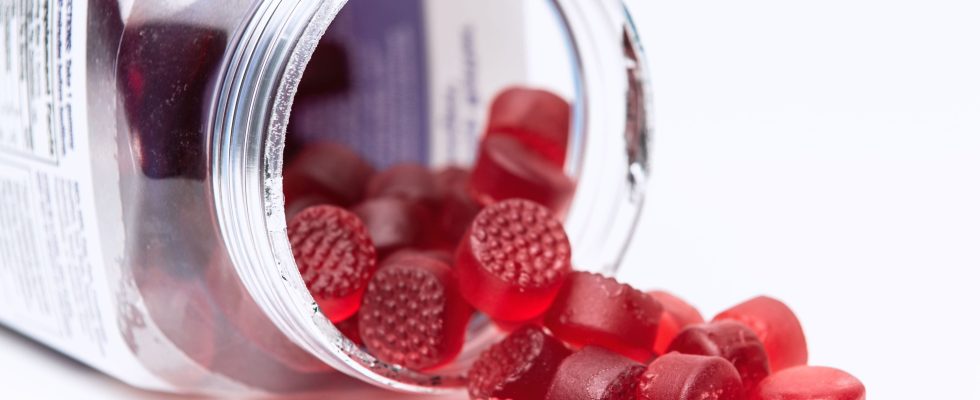American influencers love it. One of the popesses of this industry, the eldest of the Kardashian family, Kourtney, is doing business directly: she has created her own range of products. And confirmed the siblings’ taste for scandal, since one of its offers aims to correct the intimate odor of women… Enough to arouse the consternation of gynecologists on the other side of the Atlantic. More reasonable, the French stars of social networks nevertheless remain seduced by the alleged virtues of these chewing gums, who praise their benefits for beautifying hair and nails, who praise their effects on sleep, who ensure having found shape, or line, thanks to them. With their tangy taste, a stick-to-the-teeth texture similar to candy and flashy packaging, gummies are booming.
Over the past three years, these dietary supplements have experienced tremendous growth. And this, even if their cost is higher than their equivalents in the form of tablets and other capsules – novelty requires. GERS Data, a subsidiary of the Cegedim group specializing in data analysis in the health field, estimates that their pharmacy sales increased by 27% last year, to reach a total amount of 88 million euros. Between 2021 and 2022, the market had already jumped by 82%. A dynamism light years away from that of food supplements, helped by the marketing of these gums in supermarkets.
A plethoric offer
The pioneers of gummies in France are rubbing their hands. Since he founded Mium Lab in 2018, David Gueunoun says he has seen his turnover double every year. The current year should not escape the trend, especially with one of the star presenters of the M6 channel, Karine Le Marchand, as its new muse. So much so that in addition to Europe, Mium Lab has set out to conquer the Chinese market. A destiny which did not fail to arouse covetousness. From Arkopharma to Forté Pharma and Léa Nature via Upsa, the major French laboratories have all rushed into this tempting market, and supply a supply that has become plethoric.
In Vendée, the Havea group is one of the latest to get started. Two years ago, he took over the German start-up Bears with Benefits and its gummy bears dedicated to women. The fact that they are the main consumers of food supplements is undoubtedly no coincidence. “It took us a while to get involved in the gummies market because we found it hard to believe in it, particularly due to the presence of gelatin and a fairly low concentration of active ingredients. But the products have evolved and the market has gone beyond the stage of fashion”, assures its president and general director, Nicolas Brodetsky.
A position which well sums up the questions surrounding these chewing gums. On the other hand, they would have the virtue of improving compliance, that is to say the ability of a consumer to complete a course of dietary supplements. “It is estimated that 8 out of 10 people do not complete their cures with existing dosage forms [NDLR : comprimés, solutions buvables…]. The fact that the gummies do not require a glass of water to be ingested makes them easier to take,” explain Pierre Lemaigre-Voreaux, consultant in the life sciences department, and Thomas Paschal, co-director of the industry division of the consulting firm Alcimed. An asset with children, attracted by these candy-looking gums which, on the other hand, some perceive as a danger, due to the mix of genres between the world of confectionery and that of health.
Sugar, an annoying guest
“Gummies are of interest because they are better accepted by children and young people than more traditional oral forms, but also by people who have difficulty swallowing. It is however necessary to respect the dosage carefully and to only cures, so as not to establish their consumption over the long term without the advice of a health professional”, summarizes Odile Chambin, professor of galenic pharmacy at the University of Burgundy, in Dijon. At the risk of leading to an overdose, although their active content is considered low. Their composition is also singled out. An analysis by Alcimed concludes that 40 to 60% of these products contain sugar or sweeteners when vitamins, minerals and other active ingredients represent only 1 to 10%. “The promise of gummies is to do less and better, thanks to better compliance. This makes it possible to fill the possible lack of active ingredients in the product compared to other forms,” considers Thomas Paschal.
Aware that sugar and promises of better health do not necessarily go well together, more and more laboratories are promoting their guaranteed “sugar-free” gums in capital letters, a way of distinguishing themselves from the competition. “Fashion has opened the way to low-quality products which have harmed gummies, even though they have real virtues in terms of compliance. But these products are far from being general”, insists David Gueunoun. And to ensure that Mium Lab has always ignored glucose, while favoring fruit pectin over animal gelatin to guarantee the texture of its food supplements, even when its laboratory was called Les Miraculeux. A birth name from which the entrepreneur has decided to part ways, in particular to avoid any “over-promising speech” to consumers and authorities. Miraculous or not, these chewing gums seem to have a bright future.
.
